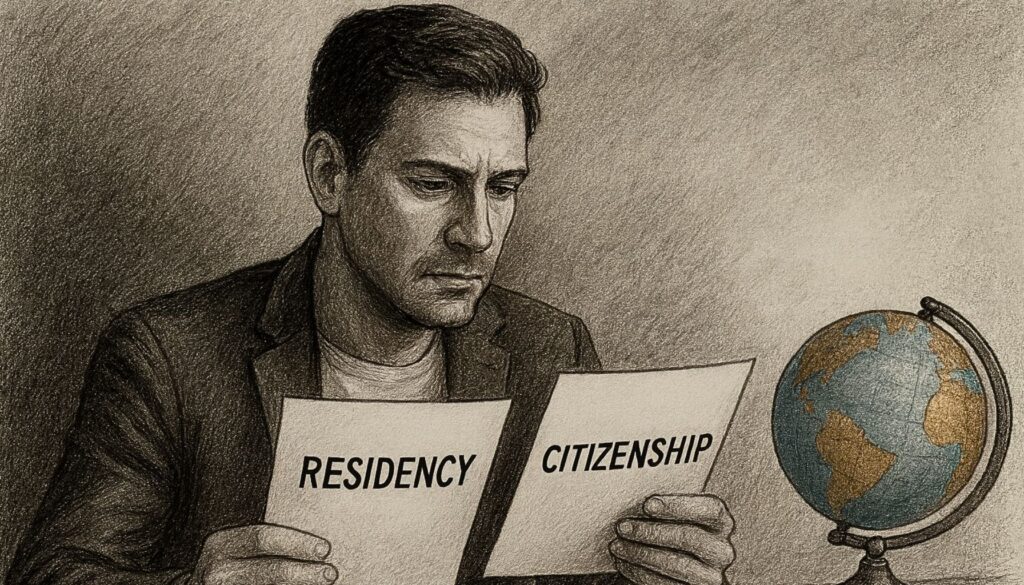Peace doesn’t last long if you think moving abroad is enough.
Today, Fiscal Surveillance and Digital Espionage in 2025 no longer require hidden cameras or detectives.
Your phone, your credit card, your social media are all it takes.
What seemed unlikely just a few years ago is now a fact. A New Fiscal Control Regulation in Europe can instantly connect your location, your spending, and your online activity. Add to that the rise of biometric tax scanning systems in public spaces: cameras reading your face, sensors analyzing your walk, microphones recording your voice.
Who activates all this? The same authorities who, without notifying you, use European Fiscal Algorithms to decide whether your behavior is coherent… or suspicious.
Sound exaggerated? Let me introduce you to Lucas.
He closed his chapter in Spain, changed his official residency, rented an apartment by the sea in Cyprus, opened a local bank account… and finally breathed easy.
For a while, everything seemed fine.
Fewer taxes, less stress, better quality of life…
But then came a plot twist that will leave you stunned. And we tell it here, in this blog—which will also help you understand how Tax Monitoring with AI, automated fiscal surveillance, and the erosion of privacy in 2025 really work.

Book a consultation with us today and we’ll show you how.
Indice del artículo
What No One Told You About the New Fiscal Control Regulation in Europe
In 2025, Fiscal Surveillance and Digital Espionage no longer need to prove you committed a crime.
They only need your behavior not to match the statistical pattern that European Fiscal Algorithms are trained to expect.
Did you declare everything? Did you pay every cent? It doesn’t matter.
If your habits don’t align with those of someone considered “fiscally consistent,” the system will label you.
Lucas didn’t hide anything. But the issue wasn’t what he did, It was what the system believed he did.
From Fraud to Fiscal Risk Profiles: How You Get Tagged in 2025
A fiscal risk profile is someone who, according to the system, lives above their declared income, uses too much cash, makes payments with foreign cards, reports suspicious losses, or maintains a lifestyle that doesn’t match their earnings.
But it can also be someone who simply behaves differently. France and Germany are already implementing fiscal risk prediction systems based on models trained with thousands of taxpayer histories.
And in the middle of this chaos stood Lucas.
No evasion. But his phone said one thing, his transactions another, and his digital behavior didn’t match that of a typical Cyprus resident.
Lucas didn’t know it yet, but he was one step away from being flagged as a fiscal risk profile.
Tax Monitoring with AI: European Fiscal Algorithms in Action
Lucas rented an apartment by the sea, opened a Cypriot bank account, and finally exhaled.
He wanted to start fresh. Live peacefully. Without the constant fear of making a mistake every time he moved money or paid for a coffee.
But in 2025, at the height of Fiscal Surveillance and Digital Espionage, tax agencies don’t wait for you to make a mistake. They look for patterns.
Tax Monitoring with AI consists of automated systems that cross-check massive amounts of banking, migration, commercial, and digital data to detect fiscal “anomalies.” If you travel too much, pay from the “wrong” location, or your financial profile doesn’t match your digital behavior… the system flags you.
Spain’s 2025 Tax Control Plan and the Automatic Fiscal Quarantine
What triggered the alarms wasn’t undeclared income or a suspicious transaction. It was a pattern. Lucas’s phone occasionally connected to Wi-Fi networks in Spain. His bank card was used during a layover. Roaming remained active for a few days. And those data points, collected from various sources and cross-referenced through European Fiscal Algorithms created an alternative narrative: “Lucas is still in Spain.”
The 2025 Tax Control Plan, promoted by Spain’s tax authority, formalizes this predictive logic.
The new algorithms now cross your financial life with your digital activity and migration history.
Lucas received a letter from the tax office. Then came blocked processes. Frozen refunds. A “verification procedure.” Welcome to fiscal quarantine.
What Is Fiscal Quarantine? Fiscal quarantine is a measure applied by Spain’s tax authority that allows them to continue monitoring a taxpayer for up to four years after changing tax residence.
Even if you no longer live in Spain, the administration can still track your activity if it suspects your exit was irregular—or just “inconsistent.”
In 2025, this tool has become even more aggressive: The system monitors where you operate from, what you consume, and how you behave online in order to “confirm” whether you truly left.
Roaming, Cards, and Networks: How Your Data Is Cross-Checked Without You Knowing
In 2025, European tax authorities don’t just access your financial history. They also cross-reference your digital presence with your tax behavior, using tools powered by artificial intelligence.
The European Parliament itself, in its fiscal interoperability strategy, acknowledges that these technologies are used to “predict risk behaviors,” based on variables ranging from your IP location to your travel frequency or cross-border payment activity.
And once all that data is combined, the system doesn’t need you to explain anything. It already has its own version of your life. That version is built with the help of European Fiscal Algorithms, designed to detect patterns considered incoherent. And it doesn’t matter if you declared everything, if something doesn’t fit, an alert is triggered.
Because in 2025, Fiscal Surveillance and Digital Espionage don’t require evidence of evasion.
Your spending habits, your browsing history, even the topics you follow online can feed predictive models that classify your profile. Do you consume content about international taxation? Do you interact with accounts critical of the system? Do you buy books about tax planning?
You’re not committing a crime. But those same interests, if they resemble those of someone previously sanctioned, can get you flagged. And the worst part? You’re not the one doing it.
Your digital behavior is. And it’s interpreted by a system that doesn’t know you but decides for you.

Automated Fiscal Surveillance in Europe: When the Algorithm Becomes the Judge
In 2025, Fiscal Surveillance and Digital Espionage no longer require specific suspicions or evidence. The algorithm doesn’t forget, doesn’t interpret nuance, and doesn’t listen to explanations. Today in Europe, the judge isn’t always human.
The AI Pact Between the EU and Big Tech: The Agreement You Never Accepted
In 2024, companies like Amazon, Google, Microsoft, and OpenAI signed what Brussels called the AI Pact. A “voluntary” agreement to align the development of artificial intelligence with European values.
Sounds good. But the text is clear: they must design their algorithms to collaborate with public authorities in cases of “fiscal risk” or “social interest.”
That means the same algorithms recommending products can also feed systems that profile people.
Or worse: classify them based on what they consume, read, comment on, or publish.
And under the umbrella of a New Fiscal Control Regulation in Europe, there’s no longer a difference between a user and a taxpayer.
Digital espionage and mass profiling. Sound paranoid?
Today, watching a video about cryptocurrencies, following an account on financial freedom, or reading a book on tax planning may be enough to place you into a fiscal risk profile.
Once profiled, your data can be shared between agencies, banks, and governments. Without your consent. Without transparency. Without defense. That’s how automated Fiscal Surveillance and Digital Espionage works. It doesn’t need to prove you did something wrong. It just needs to predict that you might.

Biometric Tax Scanning: Your Body, Your Tax Password
In 2025, Fiscal Surveillance and Digital Espionage go beyond your transactions or location. Now, they target your body. Literally. The way you walk, your voice, your gestures, even your heart rate can be used as tax-relevant data.
AI Act of the European Union and Biometric Surveillance: The Exception That Legalizes Digital Control
The AI Act of the European Union is the first major European law to regulate artificial intelligence.
It was approved in 2024 and comes into force in 2025. On paper, it claims to protect your fundamental rights.
In practice, it builds the perfect framework to legitimize Fiscal Surveillance and Digital Espionage.
According to Article 5 of the AI Act, the use of real-time biometric surveillance in public spaces is prohibited.
But immediately after, it’s allowed “in exceptional situations”—such as terrorism, imminent threats, or… public interest.
The most concerning part? This type of technology can be activated without your consent. Because once it’s labeled a tool of public interest, it no longer requires a court order or prior notice. And just like that, what looked like a ban ends up legalizing digital espionage with a simple technical justification.
Airports, train stations, government buildings… Under today’s legal interpretations, all of them are “high-risk environments.”
Cameras, Microphones, and Tax Sensors: Surveillance Without Consent
Automated fiscal surveillance doesn’t need a tax officer. A camera, a microphone, or a sensor is enough.
There are already systems capable of identifying people by how they walk (gait recognition), by the tone of their voice, or by biometric patterns used at an ATM. Lucas may have been detected at an airport. Or his voice recorded by an ambient microphone. Or his gait matched with a profile in a database. The result is always the same: automatic suspicion, fiscal lockout, and the burden of proof placed on the taxpayer.
And in the world of digital espionage and data privacy in 2025, this isn’t considered abuse.
It’s the new standard.

Digital Espionage and Data Privacy in 2025: Is There Anything Left to Protect?
In 2025, Fiscal Surveillance and Digital Espionage are not conspiracy theories they are public policy. Europe has built a system where privacy is an illusion and suspicion is the default. Two pillars hold this architecture together: the Democracy Shield and the Digital Services Act (DSA). Both promise protection, but deliver control.
The Democracy Shield: Preventive Control Disguised as Protection
Announced in July 2024, the Democracy Shield is a European Union initiative aimed at protecting the integrity of information and preventing foreign manipulation. However, its implementation has raised concerns about expanded state surveillance and restricted freedom of expression.
Under this framework, authorities can monitor and classify online content even before it’s deemed illegal. The vague definition of “harmful information” allows broad interpretation, which could lead to censorship of legitimate opinions under the guise of protecting democracy.
Digital Services Act: Content That “Harms Social Cohesion” Will Be Censored
The Digital Services Act (DSA), in effect since 2024, imposes obligations on online platforms to address illegal and harmful content. While its stated goal is user protection, the DSA has been criticized for its potential to restrict free speech.
The law requires platforms to remove content deemed “harmful to social cohesion” a vague category that could include political discourse or legitimate criticism. In addition, the DSA imposes heavy penalties for noncompliance, potentially encouraging excessive content removal to avoid fines.
So, Where Does Data Privacy Stand in 2025?
Lucas wasn’t the first. And he won’t be the last.
Because in today’s Europe, you don’t need to break the law to be watched. You just need your life not to follow the pattern the system expects. That’s when Fiscal Surveillance and Digital Espionage kick in automatic, preventive, silent.
The 2025 Tax Control Plan, published by Spain’s tax agency, confirms what has already become the norm:
using artificial intelligence to evaluate your fiscal risk level not based on what you declare, but on what you do.
How you move. Where you operate from.
What your banking, migration, and digital history say when cross-checked in a single database.
You no longer build your own profile. The system does using fragments that once belonged to you, but are no longer private.
Redesigning Your Tax Residency in 2025: Countries That Still Think for Themselves
In a world dominated by Fiscal Surveillance and Digital Espionage, some countries still offer a way out.
Not because they’re tax havens, but because they haven’t surrendered to automatic control.
Want to know which countries? Click the link below:
Low-Tax Countries for Expats in 2025: Rare Destinations Without CRS and With 0% Legal Taxation
Freedom Isn’t Hidden. It’s Designed.
If you’ve made it this far, you already get it: In 2025, your freedom doesn’t depend on what you do but on how the algorithms interpret it.
And if you don’t have a clear fiscal, digital, and migration strategy, the system will drag you in.
Even if you’ve never done anything wrong.
So the real question is: Will you wait for that letter to arrive? Or will you prepare today?
👉 Book a consultation with us. Let’s design your Plan B together.



